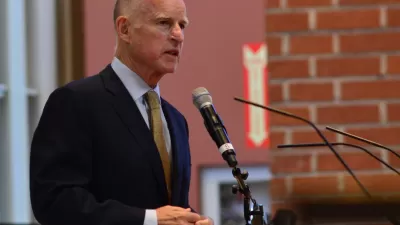At a new affordable housing project in a low-income neighborhood of San Francisco, Gov. Brown signed the package Friday that places a $4 billion housing bond on the ballot next year, adds a $75 real estate transaction fee, and streamlines permitting.

"The governor signed the legislation surrounded by lawmakers and advocates at Hunters View, a $450-million project that is redeveloping what was once crumbling public housing into new homes for 700 low- and middle-income families," reports Liam Dillon from Bayview-Hunters Point on Friday for the Los Angeles Times. "Speakers at the ceremony hailed the package of bills as a sea change in how the state handles housing issues."
Three senate bills, SB 2, 3, and 35, received the most media attention. Other bills signed previously covered by Planetizen:
- SB 167: Housing Accountability Act, aka anti-NIMBY law, fines cities if they fail to comply with housing law, and SB 166: 'No Net Loss Zoning' bill, limits denial of housing projects. Both are authored by Sen. Nancy Skinner, D-Oakland and were posted here.
- AB 1505 by Assemblymember Richard Bloom (D-Santa Monica) will restore the right to require inclusionary zoning in rental units .
- AB 199 by by Assemblyman Kansen Chu (D-Milpitas) requires previously exempt development to be subject to 'prevailing wage' requirements. [This bill was signed on Sept. 15 and not part of the 15-bill package].
The remaining eight bills are among the 90 bills signed by Brown from Tuesday through Friday listed by Renee Schiavone of Patch:
- SB 540 (Roth) streamlines the environmental review process for certain local affordable housing projects.
- AB 72 (Santiago/Chiu) strengthens the state's ability to enforce laws that require local governments to achieve housing goals.
- AB 73 (Chiu) gives local governments incentives to create housing on infill sites near public transportation.
- AB 571 (E. Garcia) makes it easier to develop farmworker housing by easing qualifications for the Farmworker Housing Tax Credit.
- AB 678 (Bocanegra) increases the standard of proof required for a local government to justify its denial of low- to moderate-income housing development projects. (AB 678 is identical to the aforementioned SB 167, the Housing Accountability Act)
- AB 879 (Grayson) authorizes a study of local fees charged to new residential developments that will also include a proposal to substantially reduce such fees.
- AB 1515 (Daly) allows housing projects to be afforded the protections of the Housing Accountability Act if the project is consistent with local planning rules despite local opposition.
- AB 1521 (Bloom/Chiu) gives experienced housing organizations a first right of refusal to purchase affordable housing developments in order to keep the units affordable.
Hat tip to Gladwyn D' Souza.
FULL STORY: Gov. Brown just signed 15 housing bills. Here's how they're supposed to help the affordability crisis

Planetizen Federal Action Tracker
A weekly monitor of how Trump’s orders and actions are impacting planners and planning in America.

Maui's Vacation Rental Debate Turns Ugly
Verbal attacks, misinformation campaigns and fistfights plague a high-stakes debate to convert thousands of vacation rentals into long-term housing.

Restaurant Patios Were a Pandemic Win — Why Were They so Hard to Keep?
Social distancing requirements and changes in travel patterns prompted cities to pilot new uses for street and sidewalk space. Then it got complicated.

In California Battle of Housing vs. Environment, Housing Just Won
A new state law significantly limits the power of CEQA, an environmental review law that served as a powerful tool for blocking new development.

Boulder Eliminates Parking Minimums Citywide
Officials estimate the cost of building a single underground parking space at up to $100,000.

Orange County, Florida Adopts Largest US “Sprawl Repair” Code
The ‘Orange Code’ seeks to rectify decades of sprawl-inducing, car-oriented development.
Urban Design for Planners 1: Software Tools
This six-course series explores essential urban design concepts using open source software and equips planners with the tools they need to participate fully in the urban design process.
Planning for Universal Design
Learn the tools for implementing Universal Design in planning regulations.
Heyer Gruel & Associates PA
JM Goldson LLC
Custer County Colorado
City of Camden Redevelopment Agency
City of Astoria
Transportation Research & Education Center (TREC) at Portland State University
Jefferson Parish Government
Camden Redevelopment Agency
City of Claremont





























